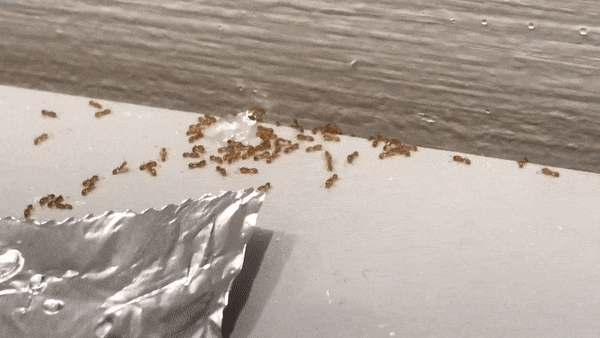What Kills Pharaoh Ants - The Ant Colony With Multiple Queens
March 1, 2024
Let us set the scene. You’ve just finished spraying for ants around your house, and just as you start to feel relief, you notice your problem has multiplied! The culprit— pharaoh ants. Pharaoh ant queens can easily triple an ant infestation as they have the ability to create more queens when threatened, and before you know it, your problem is much more significant. Find out how this ant colony with multiple queens can cause homeowners grief, and learn what kills pharaoh ants so you can keep your home free of them.
Why are there more ants after spraying?
While it can be normal to see more ants for a bit after spraying or baiting for an ant infestation, pharaoh ant colonies are unique because they will truly produce more ants after an ant treatment. The pharaoh ant queen will release a hormone when threatened that develops worker ants into new queens, a process known as “budding.” Since this species forms ant colonies with multiple queens, this means a pharaoh ant infestation can easily become ten times the original problem if you try to spray them away!
Budding can also take place if the colony gets too large. Pharaoh ant colonies vary in size and are capable of having thousands of worker ants and anywhere from two to over 200 pharaoh ant queens. The pharaoh ant queen will produce more pharaoh ant queens to divide the oversized colony into smaller ones which can not only make your home infestation bigger, but spread it to new locations. Additionally, pharaoh ant queens can live between four to twelve months, so these infestations aren’t going to go away quickly if not treated properly.
What do pharaoh ants look like?
Pharaoh ants are only 2mm (or 1/16 inch) in size and range in color from light yellow to red to brownish. Pharaoh ant queens are typically darker than worker ants, and their abdomens are usually red or black.

Being able to identify a pharaoh ant can save you a lot of time and stress as you’ll want to get on top of the problem before it gets out of hand. However, spotting pharaoh ants in your home can be challenging since these pests are extremely small. Most infestations are only discovered after a sizable colony has formed. Pharaoh ant colonies are also difficult to identify since they are a close relative to the thief ant, a very common ant species in Iowa. For this reason, when the experts at Preferred Pest Control are called for an ant removal treatment in Des Moines, we take extra care in making sure we’ve identified the correct type of ant we’re dealing with. This helps us get rid of pharaoh ants faster by not spraying the area and using the proper baiting techniques.
What attracts pharaoh ants?
Like all ants, pharaoh ants are on the lookout for something sweet. Proteins, oils and even other dead insects are common food sources for these pests. They hide in inconspicuous and moist places where they can steal food undetected. This makes locations like kitchens or anywhere food is left unconcealed inviting to their presence.
Unfortunately, a common place to find these ants is hospitals, which can be very dangerous since pharaoh ant colonies are capable of transmitting various bacterias or pathogens including salmonella and Streptococcus. In a hospital, these ants can invade many locations and even instruments like IV lines because they’re so small, risking infecting patients’ wounds.
Our commercial team performs regular pest control services for hospitals, checking for a variety of insects that invade healthcare facilities, such as pharaoh ants. Learn more about our commercial pest control services.
How to Get Rid of Pharaoh Ants
This ant species can be extremely difficult to eliminate. Do NOT spray insecticides to get rid of pharaoh ants! Ant baits will work much better, however, the number one way to control and eliminate these pests from your home is to reach out to professional exterminators.
When our Des Moines ant exterminators are called to an ant infestation, we assess what type of ant we’re dealing with, and if we determine it’s a pharaoh ant colony, we use gel baits. These baits are sweet, attracting the colony to them. The gel bait is placed in areas of ant activity. Since ants are social insects, they pass food to one another through mouth to mouth exchange, a behavior known as trophallaxis. This allows the bait to be great through the entire colony without causing more queens to develop, which leads to the complete elimination of the colony.
Preferred Pest Control’s Ant Removal Treatment in Des Moines
If you come across a pharaoh ant infestation in your home, or you’re looking for ant removal treatment in Des Moines, look no further than Preferred Pest Control! Our Des Moines ant exterminators have been serving the pest control needs of Iowans for decades and look forward to helping you with your pest problem.
You can also sign up for our quarterly pest service plan and ensure your home is pest-free year-round. Schedule an appointment online or give us a call at (515) 415-5550.